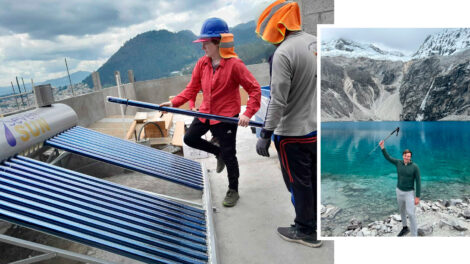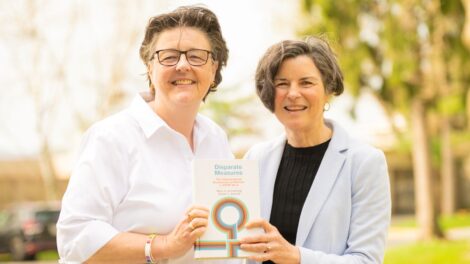Collaborating on building hope and economic independence in Moldova
By Bryan Hay
For the first time, Lafayette’s Economic Empowerment and Global Learning Project (EEGLP) is bringing its legacy of addressing real-world economic issues to a European nation, a defining, symbolic moment for both the program itself and the College as it approaches its bicentennial.
For nearly 20 years, EEGLP has partnered with well-established civic organizations to help animate their visions to establish markets and realize sovereignty, agency and liberty, following the example set by the Marquis de Lafayette, for whom the College is named.
Now EEGLP is collaborating with Eco-Razeni, an association that seeks to unlock social entrepreneurship in Moldova, an eastern European nation between Ukraine and Romania. Moldova has a goal to join the Europe Union, establish free markets, and, as former Soviet state, firmly claim its sovereignty.
“In many ways, this is our most important collaboration since the EEGLP was founded as we join hands with Moldavians eager to take their place on the world stage and help them execute their vision for the future,” says Gladstone “Fluney” Hutchinson, associate professor of economics and policy studies, founder of the EEGLP, and the Whitman Family Director of the Gladstone Whitman ’49 Endowment Funds.
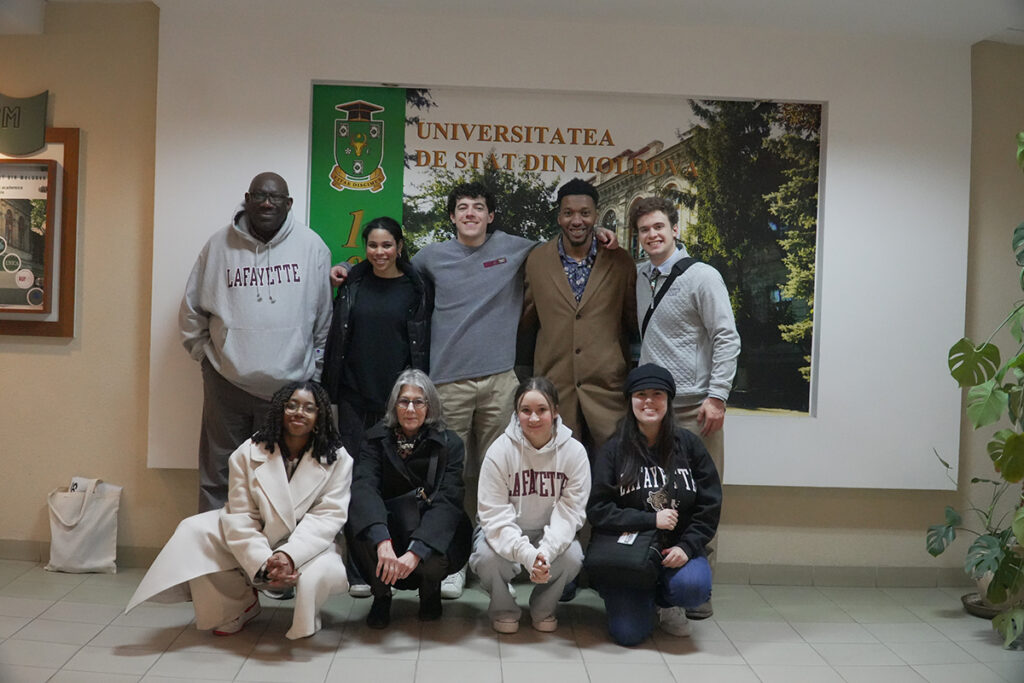
Since its founding in 2007, EEGLP, which unites faculty, students, and alumni from varied disciplines, has helped reestablish business entrepreneurship in Appalachia, Honduras, Jamaica, West Baltimore, as well as in New Orleans after the damage caused by Hurricane Katrina.
Lafayette students on EEGLP projects are sponsored by the Gladstone Whitman ’49 Endowment Funds, which, among other things, support learning about the importance of thrift, private enterprise, and entrepreneurial freedom.
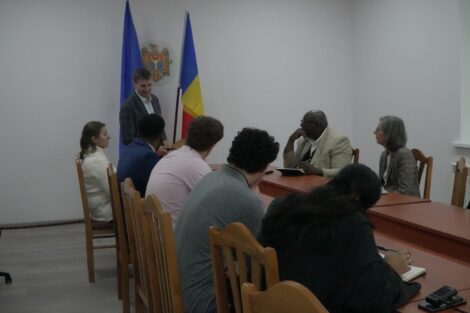
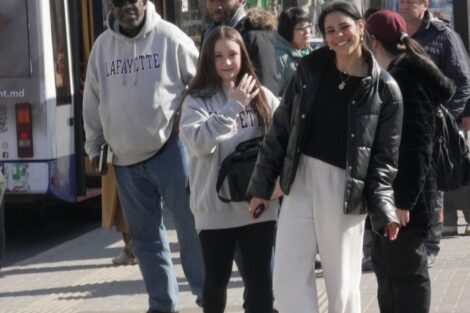
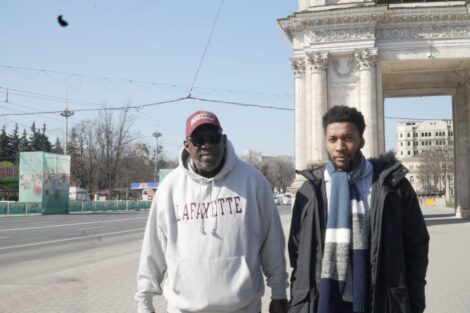
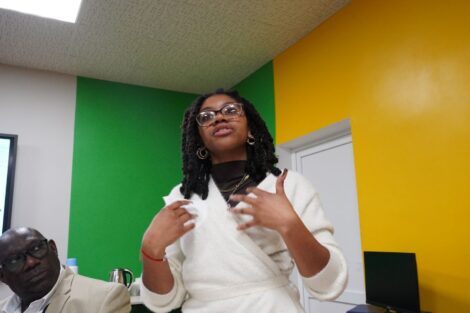
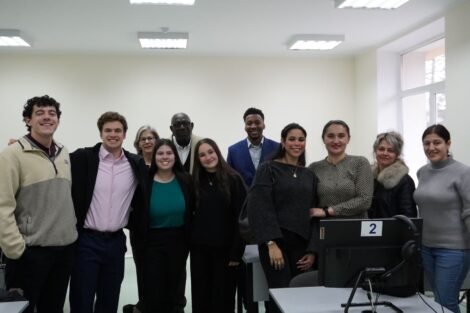
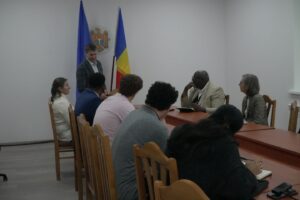
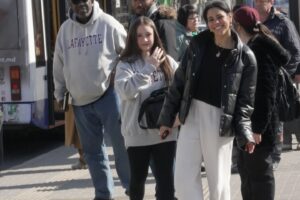
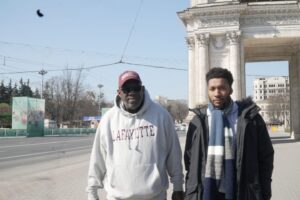
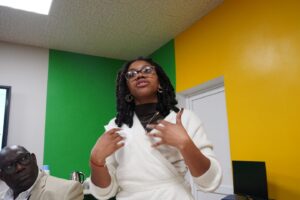
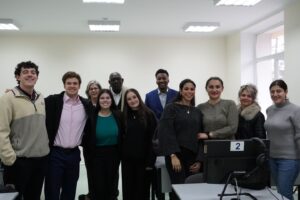
“The ability to collaborate in the production of someone else’s vision is a rare privilege,” Hutchinson says. “We get in and we partner with others in helping bring their aspirations to life and transforming them into free markets and liberty. Our work is grounded in a vision. Our collaboration in Moldova seems like a perfect alignment as we prepare to celebrate the College’s bicentennial and the figure we hold as a champion of freedom and of a flourishing humanity guided by self-determination.
“I believe in the power of developing a compelling narrative for Moldova because of the global dimensions at play here,” he adds, noting Moldova’s close proximity to the war between Ukraine and Russia. “It also represents a more defining opportunity for the College as it approaches its 200th Anniversary and is imagining the pillars of its third century.”
Hutchinson says the EEGLP outreach represents historic connections between Lafayette and Moldova, noting the College’s participation in an undergraduate exchange program with Harvard University, Stanford University, University of Maine, and Williams College in 1985-89 before Moldova broke away from the Soviet Union in 1991.Endorsed by Soviet leader Mikhail Gorbachev and President Ronald Reagan, the program included reciprocal participation by five universities in the Soviet Union.
“The Moldova initiative excellently bridges the College’s notable past with its aspirations of greatness for the future,” he adds. “Lafayette has been and continues to be a first mover in expanding social understanding between countries, now collaborating on a localized economic transitioning to liberal democracy, reflecting the Marquis de Lafayette’s fight for liberty that helps establish this nation.”
Over spring break, a team of Gladstone Whitman ’49 fellows traveled to Moldova representing the College and the EEGLP: six students, Hutchinson, and Prof. Ute Schumacher, an economics department lecturer. Their work was featured on a Moldova news program.
Over the next couple of years, beginning with a five-week visit planned over the summer, the EEGLP will collaborate with Eco-Razeni to develop an asset plan, which will serve as a blueprint to help build agency and establish economic independence in Moldova, an eastern European country between Ukraine and Romania.
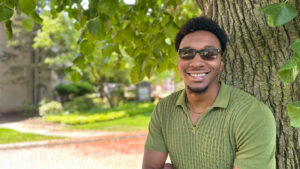
Jonathan Ford ’23
EEGLP already has a familiar face on the ground. Former Gladstone Whitman Fellow Jonathan Ford ’23, now in the Peace Corps working on a community building mission in Moldova, has helped introduce the EEGLP and its mission to Eco-Razeni. As a student, Ford was part of EEGLP’s successful West Baltimore project.
According to Hutchinson, Ford was a highly effective captain of the student team on the EEGLP’s West Baltimore project and “it is a big bonus to have the benefit of his insights and judgment on this Moldovan project.“
Over the course of the assignment, the EEGLP will strive to produce democratic, socially valuable, and sustainable market-based solutions to community economic development challenges. It focuses on strengthening the capacity of residents to exercise voice, agency and empowerment over their community affairs, and to foster their investment in the resilience, dynamic competitiveness, and sustainability of their community. The Lafayette team began the process in the village of Răazeni by meeting with local stakeholders, elected officials, and entrepreneurs, and completing an asset mapping exercise.
One of the participants, Sergiu Gurau, executive director of Eco-Razeni, welcomes the input from Lafayette and the EEGLP to help the community of Razeni focus on its strengths and inspire other Moldovans to set a course for a prosperous future.
“In our daily life, we hardly take time to understand what is our community’s strength and what it has to offer. But to have a more holistic understanding of the community, first, we must learn to know our places as places full of positive, useful resources,” he says. “Due to the Lafayette initiative and their asset mapping exercise, all of Razeni’s strengths and resources have been inventoried and depicted on a map, where all its residents can more easily think about how to build on these assets to address community needs and make Razeni, which is seeking change, a better place to live for everyone.”
He describes Lafayette’s role as “huge,” noting how every Razeni resident who participated in the asset mapping exercise “understood that a community is more than the sum of its parts; it is also not any one of those parts alone.
“So, communities can only be built by focusing on the strengths and capacities of the citizens who call that community home,” Gurau observes. “And when people work together—drawing on multitudes of relationships, experiences, resources, and skills—they look to their community in positive terms and with an enthusiastic eye toward possible partnerships.”
Hutchinson says the EEGLP outreach represents historic connections between Lafayette and Moldova, noting the College’s participation in an exchange program in 1985-89 before Moldova broke away from the Soviet Union in 1991.
“Since their independence in 1991, they have faced a number of transitioning and redevelopment challenges, including understanding how best to establish a state where no tradition of self-government or sovereignty existed before,” he says. “They’re realizing the contestations and multidimensional complexities of the demands of self-government, something that our students experience in their daily lives, including on college campuses, and as a result take it for granted. Moldova also, in their own words, is struggling with transitioning from a state-controlled economy to a free-market economy because of its inherited tradition of centralized authoritarianism.”
Recently, the Whitman scholars, still fully energized by their spring break trip to Moldova, and Hutchinson gathered around the large conference table in the Whitman Room in Simon Center to process their experience and discuss their observations and understanding of, and hopes for, the small nation with big aspirations for its political independence and deeper commitment to free-market economics driving them to greater heights in economic prosperity, citizen human flourishing, and overall realization of broad-based and inclusive liberty.
Imani Patterson ’25 (film and media studies), team captain
“I’ve been deeply invested in researching this idea of liberty. And an author that I’m reading defines liberty as the freedom from coercion, from being forced or manipulated to do something. And if that’s what liberty is defined as, when you look around, liberty is something that everyone has strong feelings for, especially when unfreedoms brush up against our boundary line. I think the most important thing that finally solidified within me when I went to Moldova is that liberty is not something owned, achieved or consumed by a person—instead it’s owned, achieved and consumed by the people. It is something collectively shared, collectively celebrated, and collectively upheld, and unfortunately undermined by a person not appreciating how their decisions and actions affect others and the community around them.”
Hayden Girolamo ’27 (economics)
“A lot of the directional goals between the mayor’s office and the economics professor whom we spoke with at the academy in the city seemed very aligned in terms of goals. We can’t say for sure that the entire country is, but at least within the people we talked to, it seemed like they all had similar goals aimed at economic independence. One of the directors at Eco-Razeni said during a dinner that Moldovans are hard workers, and they care about good food, good wine, and great company. It’s not a bad combination. The people who we met are very celebratory. They don’t look at their deficits as oh, this is going to keep us down. But they seem to be looking at themselves in an aspirational lens.”
Carson Belaire ’27 (engineering studies and economics)
“Like many of us when we came to Lafayette last year, I had no clue that I’d be traveling to Moldova over spring break. It was a great opportunity. It’s impacted my time at Lafayette because as an engineer who’s going to help a community, you need a solution. Through this experience, I’ve learned the importance of listening and really putting the understanding of the community or the people you work with first. Learning how to do that, especially with exercises like asset mapping and really trying to gauge the voice of the community, is so imperative.”
Zoe Simonte ’27 (anthropology and sociology; film and media studies)
“This trip taught me how to go somewhere with an open mind. Everything I learned from Prof. Hutchinson in my first-year seminar is not just something on paper, not just something I’m writing an essay about, but something that can be practiced.
“And for me as an anthropology, sociology, and film media major, I look at it a lot from a human perspective. I really enjoyed meeting the teenagers and the people who were around our age. I was really surprised to see how much we shared, even though we live literally across the world, in terms of interests, in terms of hobbies, in terms of just aspirations. It’s a like mindset. This trip really taught me that you can go somewhere with an open mind, and we’re all human. You know, we all have things that we bring to the table. As much as we were coming in from the outside and helping this community, it was absolutely mutual in what we all gained together.”
Fiorella Garcia Sanchez ’27 (economics)
“As an international student, I’m just grateful for the opportunity. I learned by going to Moldova that studying economics is a means to help people. Working with people from a different culture taught me it may not be about getting a job that makes a lot of money. Something I learned about myself is I’d rather work with people like that instead of in an office because I think this is more meaningful. It’s something that just makes me happier.”
